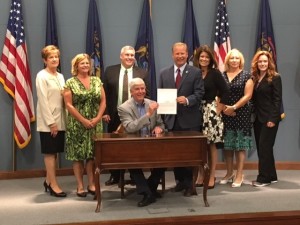TitleBytes News & Happenings
Governor Signs MLTA Priority Legislation into Law
 Governor Snyder has signed the flat recording fee package and legislation that makes revisions to the Condominium Act into law. These issues were the top legislative priorities for MLTA and were the central focus of this year’s Capitol Day. All of our hard work has successfully resulted in the creation of many new Public Acts.
Governor Snyder has signed the flat recording fee package and legislation that makes revisions to the Condominium Act into law. These issues were the top legislative priorities for MLTA and were the central focus of this year’s Capitol Day. All of our hard work has successfully resulted in the creation of many new Public Acts.
The flat recording fee package consisted of nine bills. The heart of the package was Senate Bill 599, sponsored by Senator MacGregor, which sets the flat fee at $30.00 for the recording of all documents. The other bills in the package (SBs 600-604, SB 737 and House Bills 5164-5165), amend various statutes for other documents that are recorded so that they too would have the flat charge of $30.00. It’s important to note that this legislation doesn’t impact a charter county’s ability to impose a fee schedule by ordinance or resolution with different amounts than the flat fee. However, just as is law today, a charter county cannot impose a fee that is greater than the cost of the service for which the fee is charged. There are two charter counties in Michigan, Wayne County and Macomb County, that could deviate from the $30.00 flat fee. If these counties should decide to not implement the flat fee, MLTA will be sure to share that information with you.
Getting these bills through the legislature took a considerable amount of effort and negotiation. Senator MacGregor proved to be MLTA’s legislative champion in navigating this package through state government. He pulled together numerous stakeholders, including several state departments, to develop a package that everyone could support and the Governor could sign. As a result, these bills are now Public Acts 224-232 of 2016. These new laws will go into effect on October 1, 2016.
In addition to the flat recording fee issue, MLTA worked closely with Sen. O’Brien on revisions to the Condominium Act. As you know, Section 67 of the Michigan Condominium Act requires that if a developer doesn’t complete the construction of discretionary condo improvements within 10 years, then the right to construct those improvements ceases and the land is automatically reverted to the general common elements. SB 610, which Sen. O’Brien sponsored, would make the reversion language optional, not automatic, based upon a two-thirds vote of the affected association. This bill is now Public Act 233 of 2016 and will become effective on September 21, 2016.
